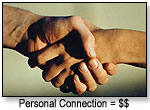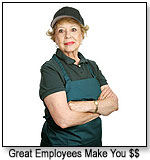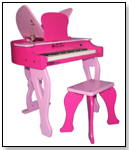|
|
Connect With Your Store's Customers - How Attitude Affects Sales Get the Dollar Signs Out of Your Eyes and Into Your RegisterThe following article was reprinted with permission from the author.  When a customer comes into your store, you need to connect to that person standing in front of you who has their own feelings, needs, and desires. To succeed, employees have to be taught a customer is not just another chance to sell someone your "stuff." When a customer comes into your store, you need to connect to that person standing in front of you who has their own feelings, needs, and desires. To succeed, employees have to be taught a customer is not just another chance to sell someone your "stuff."When employees can’t see that individual without prejudging, sizing up their pocketbook, or trying to gauge their desire for your products first – that they are an individual worthy of their time and respect – those employees run the risk of seeing that individual only as dollar $ign$. The disconnect is they don't see how their attitude affects their sales and paycheck. When employees do that, they spit out generic features and information onto the customer. That helps create a false confidence that they can make the "right" customer buy. We see that when they try to get the customer’s budget for a project, pressuring customers with a "today only" threat or using one of several tired closes on them. Customers smell it on them and walk. The hard truth is customers don’t buy from people they don’t like. And the higher the ticket, the more easily we, the buying public, can be put off. It isn’t the products’ fault, the economy or the customers’, its yours. Don’t take the losers limp, "They got all the information they needed from me and then purchased from someone else." You lost the sale because they didn’t feel you connected to them. Don't Blame the Recession  In some ways selling during a recession is the same as it’s always been, finding out what’s important to the customer and then giving it to them. In some ways selling during a recession is the same as it’s always been, finding out what’s important to the customer and then giving it to them.In another way, selling during this recession has changed because we’ve changed. We don’t pick up the phone and call a friend - we check their Facebook status. We don’t invite friends to dinner; we catch up with e-mail or a quick text on our cell phone. What this has done is left most of us feeling more detached from family and friends; more alone than ever. There’s a reason shopping has been called retail therapy; people shop to feel better about themselves. So when we land in your store, it’s an opportunity for us as customers to connect with another person. We hope that the interchange will make us feel better about ourselves, find items that interest us, and receive validation that comes from somebody appreciating us; whether that’s for purchasing a widget or simply stopping in. Without that validation, like when employees ignore us, we as customers feel more alone than we did when we walked in. And we don’t pile back in our cars to return again for that experience. No wonder sales are down for so many! Let’s face it, for many retail employees it is hard to be nice to other people. It’s like they need you to put the gas in their car before they’ll ever turn the key. These types of employees require the other person be nice to them before they can return the favor. That disconnect is why their sales go nowhere. It could be because of their upbringing or their current circumstances but they find no joy in working in retail. I have a confession that when I was first starting out I found joy in working retail because I had a rotten relationship I was in. I didn’t like myself because of it. But I found I could go to work and forget it. I had to learn to connect to people because only by doing that could I get the validation I was hungry for. Your Store as Sanctuary I know it sounds a little like a line from Cabaret but, in those four walls, life was beautiful. I helped people find what they needed, used my skills in sales to get them to treat themselves, met interesting and diverse people, and with every ring of that cash register, felt better about myself. Is that a bad thing to admit? That many times as salespeople, we need an achievement, an award, a ring of the register to feel better about ourselves? Likewise if we don’t get the sale that we tend to take it personally? Are these behaviors the nature of being human? Is an actor shallow because applause makes them feel worthy? Is it any different than a coach who strives for a winning team? A writer who completes a book? A business owner with profits in the bank? I don’t think so.  It’s not hard to be nice to someone after they purchased $1000 worth of clothes from you – you got your own Sally Field, "they like me, they really like me," validation. It’s not hard to be nice to someone after they purchased $1000 worth of clothes from you – you got your own Sally Field, "they like me, they really like me," validation.What takes practice is to engage someone when they purchase a $3 cup of coffee or come in "just to browse." And that’s the beauty of retail; we get to work on that with every person who enters our door. Analyze Your Mistakes To see how well you are connecting, here are some examples of things you might want to notice and ask yourself during and after an encounter with a customer: ▪ What did I say just before she crossed her arms? ▪ Why didn’t they reach out to touch the product when I showed them a sample? ▪ Why did they ask that question? ▪ Why does she want to redo that room? ▪ What is he looking for this product to do? ▪ Why did they choose to come in here? Why now? ▪ Are they fixing up their home because work is so hectic? ▪ Are they looking to do something for their kid because they feel guilty about time away? ▪ Is he treating himself because no one else will do that for him? We all have needs and desires to feel worthy, important, and valued. The sales process gives us the chance to do this for others and for ourselves. It begins by connecting to the person in front of us as a person, valued and worthy of our respect and in turn, rewards us with the same.  Writer's Bio: Bob Phibbs is the Retail Doctor®, a best-selling author and speaker who has helped thousands of independent businesses compete. His new book, The Retail Doctor’s Guide to Growing Your Business has received praise from both Inc. magazine and USA Today and can be found at your local bookstore or ordered at http://www.retaildoc.com/guide. He and his work have been featured in the New York Times, the Wall Street Journal and Entrepreneur magazine. Questions? Contact Bob at info@retaildoc.com. This article was reprinted with permission of the author, Bob Phibbs, aka The Retail Doctor®. Read more articles by this author Writer's Bio: Bob Phibbs is the Retail Doctor®, a best-selling author and speaker who has helped thousands of independent businesses compete. His new book, The Retail Doctor’s Guide to Growing Your Business has received praise from both Inc. magazine and USA Today and can be found at your local bookstore or ordered at http://www.retaildoc.com/guide. He and his work have been featured in the New York Times, the Wall Street Journal and Entrepreneur magazine. Questions? Contact Bob at info@retaildoc.com. This article was reprinted with permission of the author, Bob Phibbs, aka The Retail Doctor®. Read more articles by this author |
| ||||||||||||||||||||||||||||||||
Disclaimer Privacy Policy Career Opportunities
Use of this site constitutes acceptance of our Terms of Use.
© Copyright 2025 PlayZak®, a division of ToyDirectory.com®, Inc.



